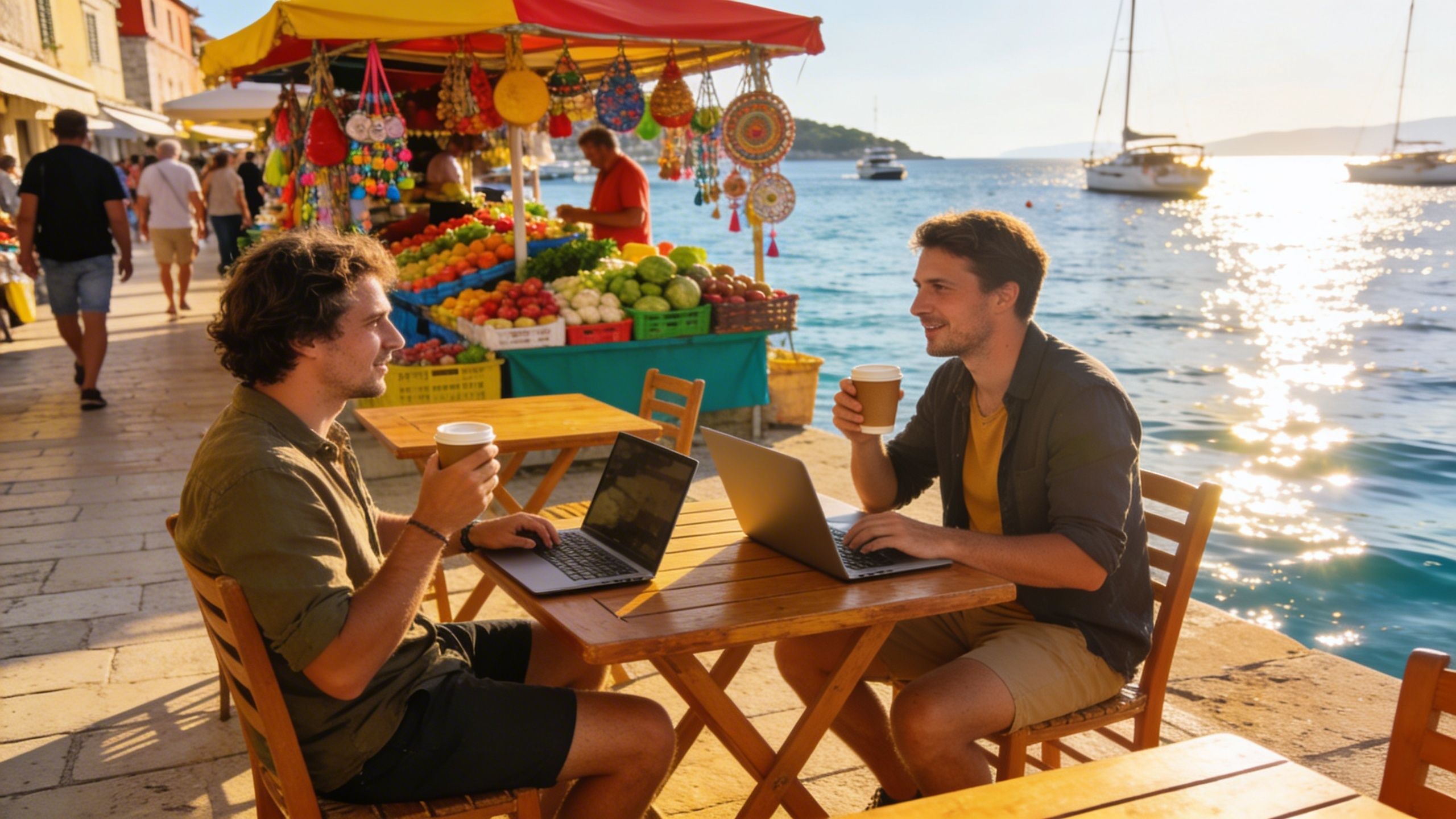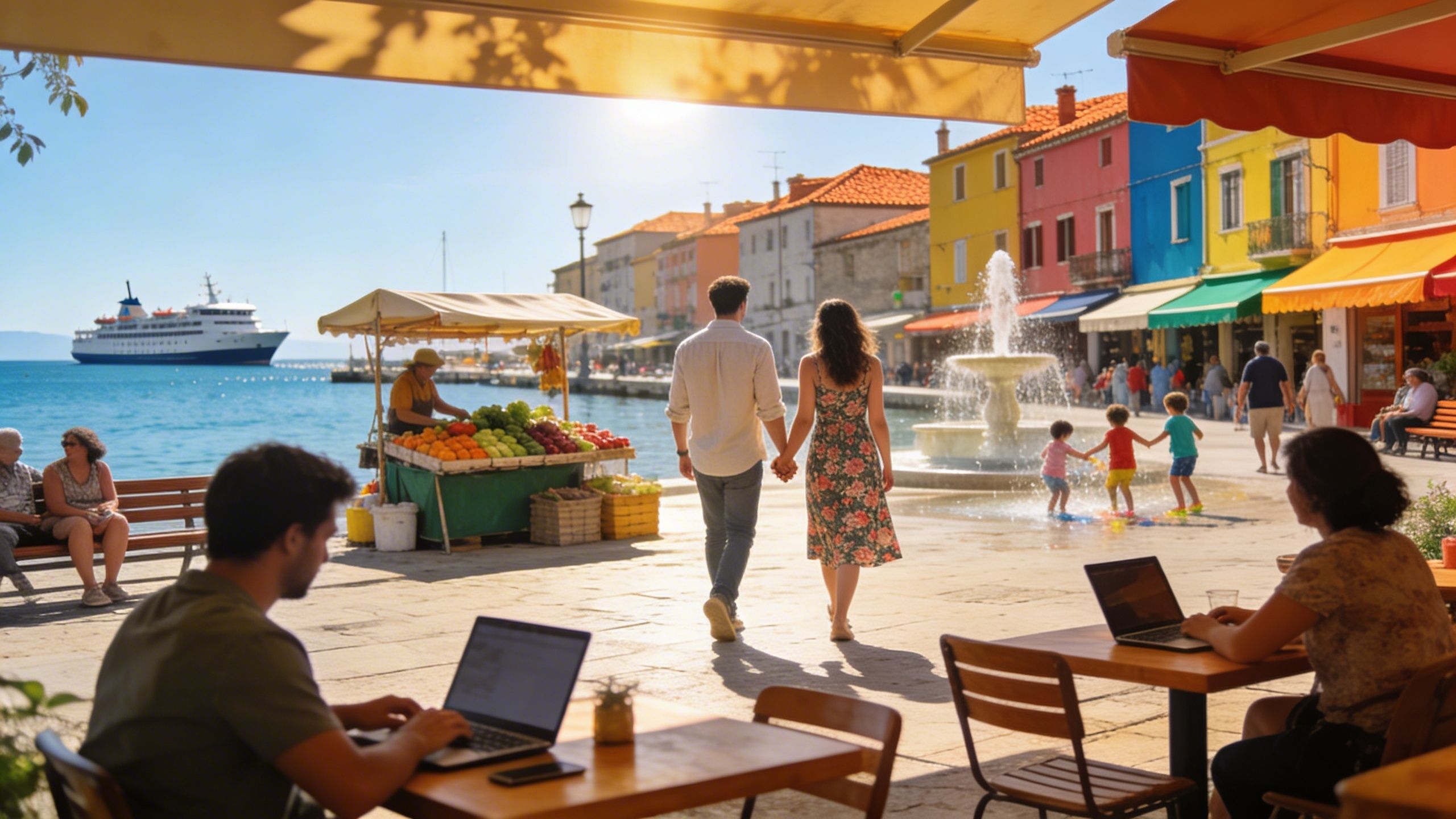Croatia: Financing, Banking & Buying Steps
How to finance and bank your move to Croatia: budgets, taxes, mortgages and nomad-friendly banking steps with local market citations.
Imagine stepping out of a sunlit kafić (coffee bar) in Split, laptop bag slung over your shoulder, and choosing between a same-day coworking drop-in or a late-afternoon swim in the Adriatic. Croatia feels alive, familial and quietly efficient — but buying property here blends that Mediterranean rhythm with EU rules, local taxes and banking steps you’ll want nailed down.
Living the Croatia life

Day-to-day life in Croatia mixes old stone streets with modern tempo. Zagreb hums with cafés and coworking spaces; Split and Dubrovnik pulse with seaside energy and summer festivals; Rijeka and Zadar are quieter, creative hubs. Winters are slower, summers are festival-packed — plan seasonally when buying so your neighbourhood fits both your work rhythm and social life.
Neighborhood pulse: Zagreb, Split, Dubrovnik and the islands
Zagreb’s Maksimir and Tkalčićeva offer cafes, easy tram commutes and reliable fiber — great for nomads who need urban infrastructure year-round. In Split, Diocletian’s Palace edges meet the Riva promenade; choose quieter Varoš or Bacvice for a better work/life balance. Dubrovnik’s Old Town is magical but touristy; nearby Lapad and Cavtat give calmer living options with fast ferries to islands.
Food, markets and weekend rhythms
Picture weekend trips to Dolac market in Zagreb for citrus and prosciutto, or buying fresh fish at Split’s Green Market before a sunset grill. Coffee culture is strong — short espressos, long catch-ups — and small konobas (family taverns) anchor social life. Seasonal festivals (e.g., summer music and film events) shape rental demand, so consider how tourism cycles affect both living and investment returns.
- Lifestyle highlights: Dolac market (Zagreb); Riva promenade (Split); Bacvice beach swims; Stari Grad island hikes; local konobas and seaside seafood; Saturday produce markets and small-town summer festivals.
Making the move: practical banking, finance & taxes

Dreams meet spreadsheets here. Croatia’s market is evolving — recent government moves target property taxation and long-term rentals, which affects holding costs and seasonal yields. Before you commit, map out transfer taxes, VAT rules for new builds, and how local taxes could change your ROI.
Key taxes & fees to budget
- Typical costs: 3% property transfer tax for resales (often paid by buyer); 25% VAT on new builds sold by developers; notary/registration fees and legal costs (roughly 1–2% if you hire counsel). New municipal property levies introduced in 2025 may add per-m2 charges for empty or short-term rental properties, so factor evolving rules into long-term holding costs.
Mortgages, currency and banking basics
- 1. Non-resident mortgages are available but rules vary by bank — expect 60–80% LTV ceilings and higher documentation requirements. 2. Croatia uses the kuna replacement currency (EUR adopted in 2023); local accounts and loans are typically in euros which reduces FX headaches for euro earners. 3. Open a local bank account early: it speeds transfers, sets up utilities, and helps with tax residency proofs.
Insider knowledge: common pitfalls & smart checks
Real expats say: don’t fall for postcard properties without title clarity. Confirm land registry entries, utility access, and coastal building permits if you’re on the Adriatic. Also, if you plan to live longer or bring family, check visa rules — Croatia’s digital nomad permit and its extensions changed recently and can shape whether you’re a temporary resident or tax resident.
Practical due-diligence checklist
- Hire a local lawyer to check land registry and encumbrances; obtain a cadastral extract and building permit copies; confirm VAT vs transfer-tax status on the offer; verify utility connections and broadband availability; ask the agency for recent rental occupancy data if you plan short-term lets.
Nomad-friendly living & long-term planning
- 1. Prioritize properties with reliable fiber or 4G/5G signal and a dedicated workspace. 2. Choose neighbourhoods with coworking spaces and cafes (Zagreb’s British Square area, Split’s Varoš and Bacvice, Rijeka’s Korzo). 3. Factor seasonal rental pressure: tourist hotspots are lively in summer but quieter (and cheaper to live) off-season.
Croatia is both a place to fall in love with and a market that rewards careful prep. Picture weekday productivity in a sunlit flat with a sea view, then follow up with a lawyer, local bank account, and a check on new tax rules. That balance — lifestyle first, process second — is how you turn a dream into a sustainable life here.
Dutch investment strategist guiding buyers to Greece and Spain; practical financing, tax, and portfolio diversification.


